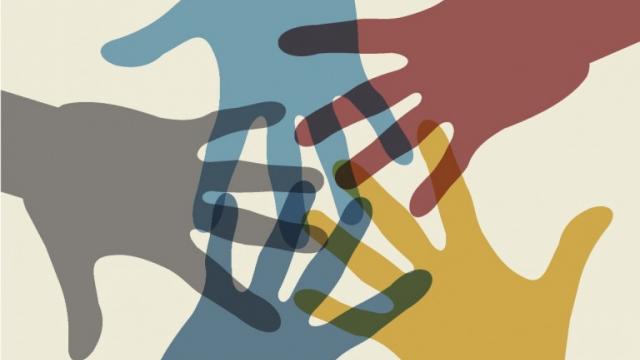
An independent, civil society organization campaigning for a fairer sharing of wealth, power and resources, Share the World's Resources recently released Sharing As Our Common Cause, a report detailing all the ways sharing can act as a unifying force to address multiple planetary crises.
Part of STWR's Global Call for Sharing campaign, the report points out that there are many different social, economic and ecological movements working within various sectors of society but there’s not a unified movement connecting them all. It then argues something that the sharing community already understands: that sharing wealth, power and resources is central to the formation of a growing movement of global citizens for a healthy planet.
Sharing As Our Common Cause explores ways we can share on a global scale, why we should be sharing, and how we can promote and advocate for sharing. Here are the key points:
Keys Ways We Can Share
Fair Share: All people should have an equal right to share the earth’s resources, without “transgressing the planet’s environmental limits.” Numerous civil society organizations, including Christian Aid, Oxfam International, and Friends of the Earth espouse the principle of sharing as part of their organizational strategies and objectives and call for “dramatic changes in how power and resources are shared in order to transform our unjust world.”
The Commons: A global community of citizens, scholars, planners, and activists, the commons movement focuses on protecting the shared resources of the earth. On a practical, everyday level, the commons is a way of framing our shared common spaces, our underutilized personal assets, our creative works, and our community projects.
Participatory Democracy: As millions of people around the world struggle for democracy and freedom, participatory democracy—a sharing of political power and economic resources—is a way of creating true democracy and securing basic rights for everyone.
Peaceful Coexistence: Whether through a redirection of military spending toward public services, or ending the competition for scarce resources through cooperative, international agreements, sharing underlies many initiatives for a global state of peaceful coexistence. As the report states, “From both a historical and common sense perspective, it is clear that competition over resources causes conflict – and there is no sense in perpetuating an economic paradigm where all nations are pitted against each other to try and own what could easily be shared.”
Economic Sharing: In order to create a more equitable and peaceful world, economic sharing is necessary. Many of the mass protest movements of recent years, including the Arab Spring demonstration, and Occupy, are connected by a drive for greater economic sharing across society.
Why We Should Advocate for Sharing
As sharing is the unifying force that unites numerous global movements, we should be explicitly advocating for sharing wherever possible. Here are some reasons why:
-
A call for sharing holds the potential to connect disparate campaign groups, activists and social movements under a common theme and vision.
-
Such a call represents the unity in diversity of global civil society and can provide an inclusive rallying platform, which may help us to recognise that we are all ultimately fighting the same cause.
-
Sharing offers a way of moving beyond separate silos and single-issue platforms, but without needing to abandon any existing focuses or campaign priorities.
-
A call for sharing can also engage a much broader swathe of the public in campaign initiatives and movements for transformative change.
-
Many people feel disconnected from political issues owing to their technical complexity, or else they feel overwhelmed by the enormity of the challenges that face us and ill equipped to take action. But everyone understands the human value of sharing.
-
By upholding this universal principle in a political context we can point the way towards an entirely new approach to economics – one that is inherently based on a fair and sustainable distribution of resources.
-
The principle of sharing represents a valuable advocacy and educational tool that can help to generate widespread public engagement with critical global issues.
-
A popular demand for governments to adopt the principle of sharing has radical implications for current economic and political arrangements, both within countries and internationally.
-
In an increasingly unequal and unsustainable world in which all governments need to drastically re-order their priorities, a call for sharing embodies the need for justice, democracy and sound environmental stewardship to guide policy-making at every level of society.
A Unified, Global Sharing Movement
As the report points out, only a collective demand for a fairer sharing of wealth, power and resources is likely to unify citizens across the world in a common cause. Individuals and organizations need to further align their sharing efforts in more concrete ways in order to overcome the “vested interests and entrenched structures that maintain business-as-usual.”
Facing numerous planetary issues, including social, economic and ecological collapse, we need to establish a global movement rooted in the principle of sharing as a guide for “restructuring our societies and tackling the multiple crises of the 21st century.” Sharing As Our Common Cause explores the perspective that sharing may represent our greatest hope for influencing economic reforms based on the needs of everyone and guided by basic human and ecological values.
Next Steps
If sharing is to be integrated into global movements as a foundational principle of a just and sustainable world, SWTR argues that we need a dramatic shift in public debate.
To get involved in STWR’s campaign to help spark public awareness and a wider debate on the importance of sharing, sign the statement affirming the fundamental importance of strengthening, and scaling up, all genuine forms of sharing.
3 WAYS TO SHOW YOUR SUPPORT
- Log in to post comments














